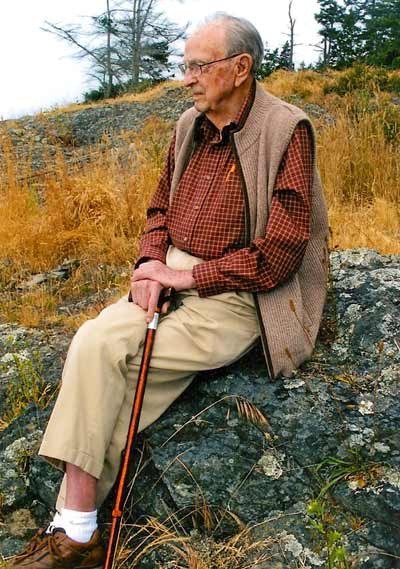By Scott Rasmussen, Journal Editor
It was back in 1947, on a chilly Thanksgiving Day, that University of Washington biology professor Arthur Whiteley and his wife, Helen Riaboff, soon to be a worldwide renowned geneticist in her own right, first stepped foot onto the sprawling grounds of Friday Harbor Laboratories.
The two were smitten. And over the course of the next 60-plus years, the Pacific Northwest power-couple of scientific research would each leave an indelible mark not only on the University of Washington, and on the Labs, but on their adopted home of San Juan Island as well.
On April 15, Arthur Whiteley died at his Seattle home, at the age of 96.
His heart finally gave out. But even after his beloved wife, Helen, passed away in 1990, at the age 69, friends and colleagues say that Whiteley’s curiosity and insatiable thirst for knowledge, and for life, never wavered. Neither did his affection for his departed wife.
A recipient of the National Institutes of Health Career Award, in 1963, Riaboff’s legacy lives on at the Labs within the hallowed walls of the Helen R. Whiteley Center, a retreat for scholars of all disciplines and for artists of all professions. The center was conceived of and guided by Whiteley himself. Colleague and friend Trish Morse, biology professor emetrius, recalls nothing was closer to Whiteley’s heart than was the center.
“He watched over it like mother hen,” Morse said. “That was his dream, and he saw his dream come true.”
Whiteley also founded a yearly scientific lecture series, in partnership with San Juan Nature Institute, that bears his name.
Born in Dogawiac, Mich., in 1916, Whiteley was the son of a newspaper man who later would make a name for himself in politics, rising to the ranks of state senator. As a child, he received a small microscope as a gift, heralding a lifelong passion for science and research to come.
In 1938, Whiteley graduated from Kalamazoo College, with a BA in biology, and a year later earned an MA in zoology from the University of Wisconsin. In 1947, while teaching at Cal Tech, sea urchins became a focus of his research and his exploration into the inner-workings of that creature continued when he accepted a teaching post in cell biology at the UW later that year.
His life wasn’t confined to the laboratory, however, Morse recalls. Concern over plans to put salmon farms in Griffin Bay, back in the mid-1980s, prompted Whiteley and like-minded researchers to launch an investigation outside the halls of academia and into the impacts, of which little was known at the time.
“We wouldn’t be getting prawns out of Griffin Bay now if they hadn’t done what they did back then,” she said. “He really was a citizen of Friday Harbor.”
— For more about Dr. Arthur Whiteley, Helen Riaboff, and the Whiteley Center, visit UW Labs website, http://depts.washington.edu/fhl/



